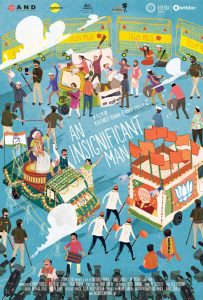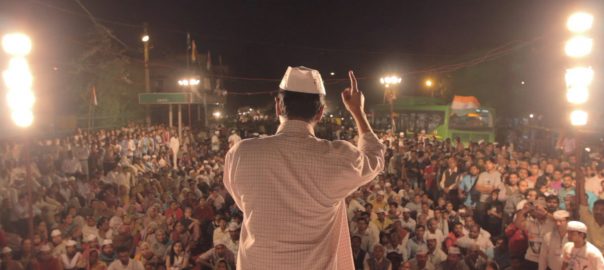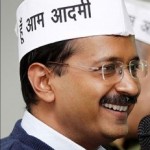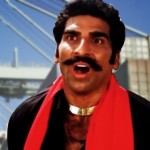 For a two-year period, cameras followed Arvind Kejriwal and his team to create An Insignificant Man, a documentary that chronicles the rise of Aam Aadmi Party to its present day leadership in Delhi. The documentary premiered on September 11th, 2016 to a packed house at the ongoing Toronto International Film Festival.
For a two-year period, cameras followed Arvind Kejriwal and his team to create An Insignificant Man, a documentary that chronicles the rise of Aam Aadmi Party to its present day leadership in Delhi. The documentary premiered on September 11th, 2016 to a packed house at the ongoing Toronto International Film Festival.
The film-makers have done a commendable job in documenting the personalities of some of AAP’s key founders, specifically Arvind Kejriwal, Manish Sisodia and Yogendra Yadav. The documentary provides great insights into our political process as well as the decision making dilemmas faced by AAP. This is not a movie review (since we literally know nothing about reviewing movies) and we have stuck to the political connotations of the events depicted in the movie.
Giving tickets to Gundas is the norm
The process that AAP went through while searching for political candidates for the 2013 assembly election has been extensively covered in the movie. In one of the scenes a volunteer seems earnestly confused as to how the party would find candidates that are not criminals and not likely to buy an election victory using money-power. Most political parties, in their obsession with winning elections, continue to back candidates who have pending criminal cases against them. While the AAP clearly said it would avoid this practice, there were instances when the party was unable to follow-through on its word.
Political parties like to portray a silver-bullet solution to all problems. Narendra Modi, Rahul Gandhi and Arvind Kejriwal have all been showcased by their parties as ones who will come into power and change everything. In this obsession, we keep filling the parliament with murderers, dacoits, thieves – essentially whoever it takes for our party/leader of choice to win.

Political Convenience Trumps Everything
All political parties start out with similar ideals. In fact most of their constitutions are so similar that they could be be interchanged. Throughout the movie, it could be seen that AAP was wrestling with maintaining its ideals. At some point during its early days, the party took a stand of taking decisions, based on ‘what the people want’. Based on scenes showing internal meetings of AAP, it seems that this ideal was almost too ambiguous to implement. When it came to ticket distribution, different volunteers seemed to be pulling for their own candidates and Kejriwal struggled to resolve this amicably. When push came to shove, Kejriwal pretty much seemed to have his way with the big decisions, and this has been one of the constant accusations made of him. Delhi-ites may remember the spate of self-fulfilling referendums that they were put through over the last few years. In order to justify their decision making, AAP continued to say that their decisions were what the people wanted, all based on self-administered referendums. So even taking outside support of the Congress (a sworn enemy on moral grounds) to form a government, could be justified with this gimmick.
All said and done, during this period the ‘crimes’ of AAP still paled in comparison to the likes of Congress, BJP, DMK, NCP etc. Additionally, Kejriwal is clearly well-intentioned and there is no question about him personally looking to benefit financially or otherwise by foraying into politics (which can not be said for most of our politicians). However, given the ‘alternative’ and ‘honest’ politics narrative that the party was pursuing, AAP has ended up becoming an easy target for critics (including this blog) whenever the party has floundered since its inception.
Yogendra Yadav will be missed by AAP
While Prashant Bhushan barely made an appearance in the movie, there was extensive footage of now expelled leader, Yogendra Yadav. Throughout the movie, it is Yadav who appears most astute at analyzing a situation and controlling the public narrative of AAP. From determining the visuals for campaigning being put out by the party to pacifying disgruntled volunteers, Yadav seems to be involved with everything and in a politically shrewd manner. He also seems comfortable openly dealing with shortcomings in the processes deployed by AAP and in one scene even speaks at length to the political compromises that need to be made in active politics.
The inception of Swaraj Abhiyan by Yadav and his intricate knowledge of AAP’s functioning is now an additional headache for Kejriwal to deal with.
India is not Delhi; Delhi is not India
Many scenes in the movie are accompanied by media clippings that complement the story playing out. Right from the days of Anna Hazare’s fast and India Against Corruption, the movement has benefited a great deal from playing out in Delhi. The Congress and BJP helped by providing plenty of soundbites (captured in the movie), that kept belittling the efforts of AAP and Kejriwal. Shiela Dixit was especially humiliated after refusing to accept the reality of a new political alternative in Delhi. All this played out extremely well in the country’s capital where a news hungry media is ever-present for a byte.
However, protests and ‘movements’ have taken place across the country for decades. For instance, Irom Sharmila recently broke her fast for a cause that is arguably far more basic in terms of human rights than anything Kejriwal or Hazare demanded. But few in the media care for the human rights of a far flung Manipuri.
Even in terms of political performance, while AAP’s debut has been commendable, many regional parties have performed similarly if not better than AAP for decades. For instance in the last Lok Sabha elections, in which AAP performed well in terms of vote-share, apart from BJP and Congress; BSP, Trinamool, Samajwadi Party, AIADMK, CPM, Telugu Desam and YSR Congress all received greater vote share than AAP. Yet, we will rarely hear about many of these parties in the main stream media.
One lasting image of the documentary is how a haughty and dismissive Sheila Dixit finally concedes defeat to a man she has pooh-poohed at for the better part of two years. The rise of Arvind Kejriwal, is an example of how our electoral system can actually work for the common man. Despite our country’s systemic issues, we are somehow able to successfully pull off the world’s most complicated elections and this in itself is a marvel. The makers of the documentary spoke about their determination to release An Insignificant Man in India in the near future. It is definitely an interesting watch for all audiences – Bhakts, Libtards & AAPtards included.
Photos courtesy: http://insignificantman.com/
 Copyright secured by Digiprove
Copyright secured by Digiprove




Only time will tell if Yogendra Yadav has chosen the right path.
With the dire shortage of capable second rung leaders and good State Leaders, the Party will depend more and more on imports from other Parties. In the end there will be little to differentiate between all the main stream parties. For Example today’s BJP is a pale shadow of the Original JanSangh and has more Congressmen as elected MPs than the Original Congress
Yes. One way to help counter this is to demand greater transparency and regulation in the way political parties are run – https://www.wahsarkar.com/political-parties-vs-rti/
The problem is AAP is deviating from the avowed agenda of transparency. Even the NC meet was held in a nontransparent way that even Senior NE Members were not allowed to carry their mobiles or even a Pen for fear that what transpired in the meeting will be leaked out. So much for Swaraj
True. Because our pol parties are obsessed with winning ,at any cost, ideals can take a backseat. Many thought AAP would try a different way.
♻✔♻#Excellent
♻ ✔♻#Beautiful
♻✔♻#Fabulous
♻✔♻#Fantasteic
♻✔♻#Awesome
♻✔♻#Lovely
♻✔♻#Super ♻✔♻#Excellent
♻ ✔♻#Beautiful
♻✔♻#Fabulous
♻✔♻#Fantasteic
♻✔♻#Awesome
♻✔♻#Lovely
♻✔♻#Super ♻✔♻#Excellent
♻ ✔♻#Beautiful
♻✔♻#Fabulous
♻✔♻#Fantasteic
♻✔♻#Awesome
♻✔♻#Lovely
♻✔♻#Super ♻✔♻#Excellent
♻ ✔♻#Beautiful
♻✔♻#Fabulous
♻✔♻#Fantasteic
♻✔♻#Awesome
♻✔♻#Lovely
♻✔♻#Super ♻✔♻#Excellent
♻ ✔♻#Beautiful
♻✔♻#Fabulous
♻✔♻#Fantasteic
♻✔♻#Awesome
♻✔♻#Lovely
♻✔♻#Super ♻✔♻#Excellent
♻ ✔♻#Beautiful
♻✔♻#Fabulous
♻✔♻#Fantasteic
♻✔♻#Awesome
♻✔♻#Lovely
♻✔♻#Super